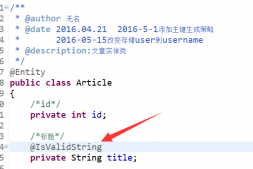前言
本文主要给大家分享了关于java求最大值的4中方法,文中给出了完整的示例代码,下面话不多少了,来一起看看吧
示例代码:
|
1
2
3
4
5
6
7
8
9
10
11
12
13
14
15
16
17
18
19
20
21
22
23
24
25
26
27
28
29
30
31
32
33
34
35
36
37
38
39
40
41
42
43
44
45
46
47
48
49
50
51
52
53
54
55
56
57
58
59
60
61
62
63
64
65
66
67
68
69
70
71
72
73
74
75
|
/***@author Prannt*求最大值(或最小值)*本例以int数据类型为例,可指定其他数据类型*///方法一:直接法,求最小值类似public class Deno05ArrayMax { public static void main(String[] args) { //数据类型可指定 int [] array = {5,15,20,30,10000}; int max = array[0];//假设第一个值为最大值 for (int i = 1; i < array.length; i++) { //和后面的数进行比较 if(array[i] > max) { max = array[i]; } } System.out.println("最大值是:" + max); }}//方法二:调用方法求最大值,求最小值类似public class Demo02Method { public static void main(String[] args) { int [] array = {5,15,35}; int max = getMax(array); System.out.println("最大值:" + max); } //有返回值,含参 public static int getMax (int [] array) { int max = array[0]; //局部变量写在方法内部 for (int i = 1; i < array.length; i++) { if (array[i] > max ) { max = array[i]; } } return max; }}//方法三:三元运算符,求最小值类似public class Demo02Method { public static void main(String[] args) { int[] arr = {5, 2, 3, 12,10,11,17,1,-1,-8}; int result = arr[0]; for (int i = 1; i < arr.length; i++){ // ? 前面的表达式为条件判断 //逻辑为:如果条件表达式成立则执行result,否则执行arr[i] result = (arr[i] < result ? result : arr[i]); } System.out.println("最大值为:" + result); }}//方法四:面向对象调用,求最小值类似public class Demo02Method { int [] arr = {9,20,5,6,1,3,7,2,4}; int num = arr[0]; public static void main(String args[]) { Demo02Method max=new Demo02Method(); //调用方法 max.getMax(); } public void getMax() { for (int i = 0; i < arr.length; i++) { if(arr[i] > arr[0]) { num = arr[i]; } } System.out.println("最大值为:" + num); }} |
总结
到此这篇关于Java中求最大值的4种方法的文章就介绍到这了,更多相关Java求最大值4种方法内容请搜索服务器之家以前的文章或继续浏览下面的相关文章希望大家以后多多支持服务器之家!
原文链接:https://blog.csdn.net/qq_38050259/article/details/108298091















